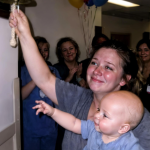A Young Mother’s Courage: Caring for Her Premature Daughter With Her Feet
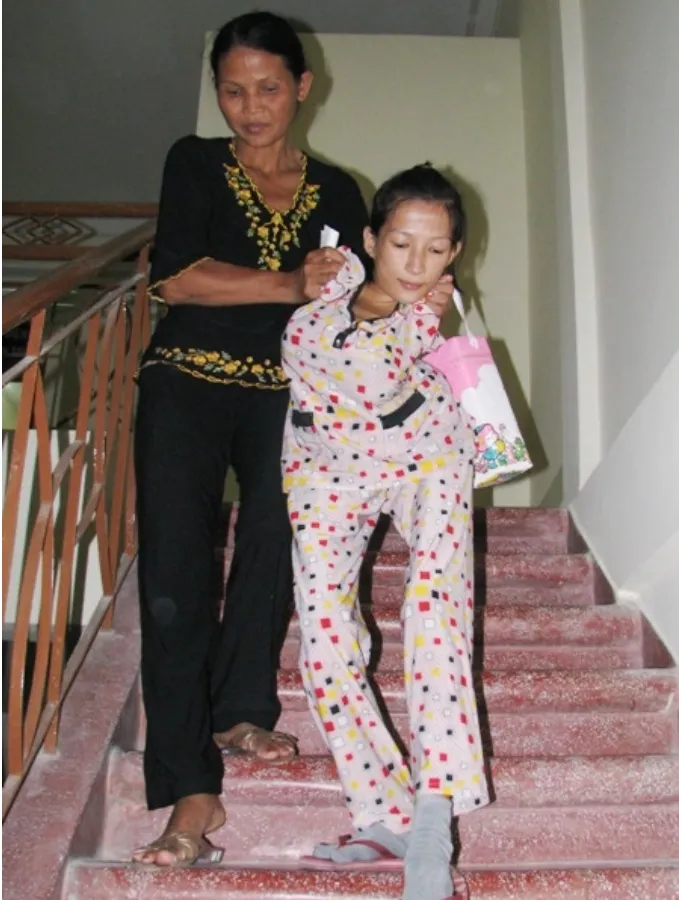
In a small village in Kiên Giang province, Vietnam, an extraordinary story of courage quietly unfolds, inspiring all who hear it. Lâm Thịng Nhung, a 23-year-old woman born without arms, has faced challenges from the very start of her life. Every task most people take for granted—eating, washing, dressing, cooking, or even walking—she performs with her feet, a testament to human adaptability and determination few can fully comprehend. For twenty-three years, Nhung has lived a life defined by perseverance, navigating a world built for hands with only the strength of her legs and toes.
Yet life, unpredictable and cruel, had more in store. Nine months ago, a misfortune struck that would change her world forever. One night, while Nhung’s mother, Thị Nại, worked in the fields, a stranger broke into their home. Nhung, small and vulnerable, was assaulted. The trauma left her shocked and weakened—a young woman whose body had already endured hardship now faced unimaginable suffering. Months later, severe abdominal pain revealed the astonishing truth: Nhung was five months pregnant.
Facing Motherhood Against All Odds
The revelation brought both fear and hope. Nhung had never imagined becoming a mother, especially under such circumstances. Her frail body, limited by congenital conditions, would now nurture life within her. Fear mingled with hope, and despair weighed heavily on her spirit. Her mother, Thị Nại, who had spent over two decades raising five children alone after Nhung’s father abandoned the family, shared in her anguish. Despite her own hardships, Nại had provided for her family with unwavering love and labor. Now, she faced the challenge of supporting her daughter through pregnancy and the birth of a premature child with scarce resources.
When the time came to deliver, the family’s situation was dire. Without sufficient funds for transportation or hospital fees, they borrowed from neighbors to reach Gò Quao District Hospital and later traveled to the Central Hospital in Cần Thơ. There, under the care of compassionate doctors and nurses, Nhung delivered a tiny baby girl, barely more than seven months gestation and weighing only 1.3 kilograms. Relief, joy, fear, and the immense burden of responsibility washed over her simultaneously. For the first time, Nhung truly realized she was a mother—but she would have to learn the most basic acts of care in ways she had never imagined.
Nurturing a Premature Child With Her Feet
Caring for her newborn was no small task. Without arms or hands, Nhung relied entirely on her feet to nurture, feed, and comfort her tiny daughter. Watching her cradle her baby with her legs was both heart-wrenching and awe-inspiring. She gently lifted her daughter using the arch of her feet and the dexterity of her toes, pressing her close with careful attention. Every motion required immense concentration, patience, and strength, yet a quiet tenderness radiated from her every gesture.
Hospital staff and volunteers were moved by her courage. Despite her condition and trauma, Nhung demonstrated an instinctive understanding of motherhood. She improvised ways to bottle-feed, change diapers, and comfort her child entirely with her feet. Observers described her skill and devotion as miraculous, witnessing toes work with precision and purpose to lift, hold, and soothe—a true testament to love transcending physical limitation.
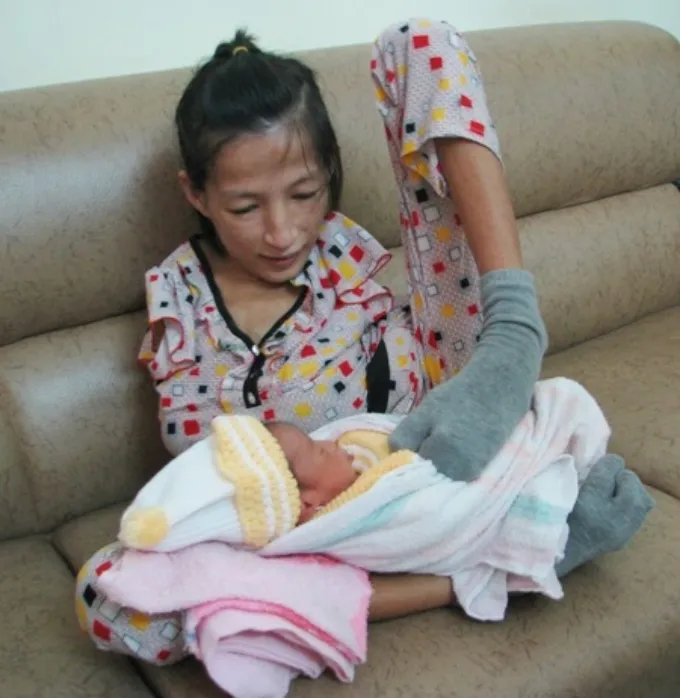
Returning Home: Everyday Triumphs
Life at home brought even greater challenges. Nhung, weighing just twenty kilograms and weakened by pregnancy, had to manage daily tasks while caring for her newborn. Each chore—from fetching water and cooking to cleaning and maintaining hygiene—required creative adaptation. Yet she persisted, displaying remarkable ingenuity and determination. Her mother, Thị Nại, continued working the fields, while Nhung found ways to care for her child and maintain the household. Together, the three generations under one roof forged a bond strengthened by struggle, resilience, and hope.
Images of Nhung cradling her daughter with her feet spread across media, social networks, and local communities. People were moved not merely by her physical skill, but by her indomitable spirit and the profound tenderness in every gesture. The sight challenged conventional notions of ability and caregiving, revealing the essence of parental love.
A Testament to Adaptability and Maternal Love
Nhung’s story is a testament not only to human adaptability but also to the unbreakable bond between mother and child. Every day presented obstacles: maintaining the infant’s warmth, ensuring proper nutrition, monitoring fragile health, and navigating poverty. Yet for Nhung, every small success—feeding, rocking to sleep, soothing cries—was a triumph against nature and circumstance. Her determination inspired friends, neighbors, and strangers alike, who offered clothing, food, and encouragement.
Despite hardships, moments of joy emerged. The bond between mother and daughter deepened with each passing day. Nhung’s careful, patient care helped her baby grow stronger, more alert, and responsive. Visitors described their interactions as transcendent, noting how quiet movements and attentive gestures conveyed resilience, love, and ingenuity beyond words.
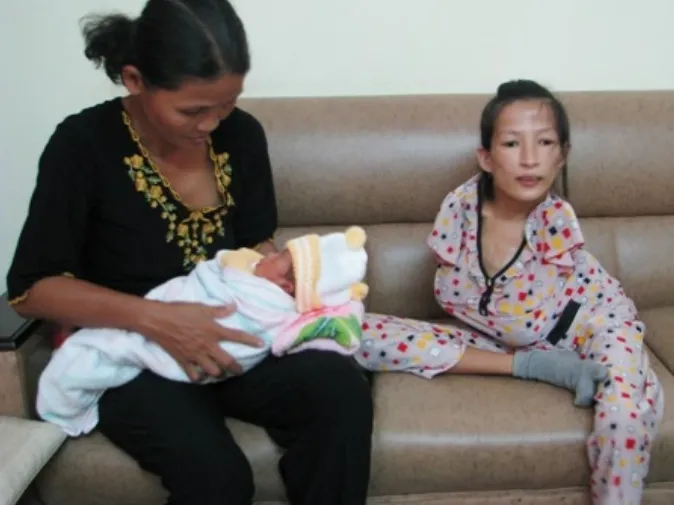
Highlighting Societal Challenges
Nhung’s journey also highlights broader societal issues: the lack of social support for people with disabilities, the vulnerability of women in isolated communities, and the difficulties of raising a child in poverty. Yet within these challenges, she demonstrates that courage is often quiet, resilience often unseen, and love measured not by what one has but by what one gives. Her daily life is a study in improvisation, determination, and human ingenuity.
As months passed, community awareness grew. Neighbors, local organizations, and volunteers rallied to support Nhung. Some donated baby supplies, others provided meals, and many offered emotional support. These small acts of kindness helped create a safety net for a mother and child whose survival once seemed uncertain. For Nhung, these gestures affirmed the power of compassion and community in the face of adversity.
Ingenuity, Dedication, and the Maternal Bond
Nhung never complained. Her focus remained on her daughter, her feet becoming hands that nurtured, comforted, and protected. Each day, she learned new ways to hold her baby safely, change clothing, or lift her into a crib or chair. Every motion carried both care and precision—a choreography born of necessity, yet infused with tenderness. Observers marveled at her ingenuity, adapting her entire life to meet motherhood’s demands.
Her infant seemed to recognize this devotion. In quiet moments, she gazed at Nhung, responding to the gentle pressure of her feet and soft hums. Though words were absent, their communication was profound. The baby thrived beyond expectations, a living testament to the power of love and commitment.
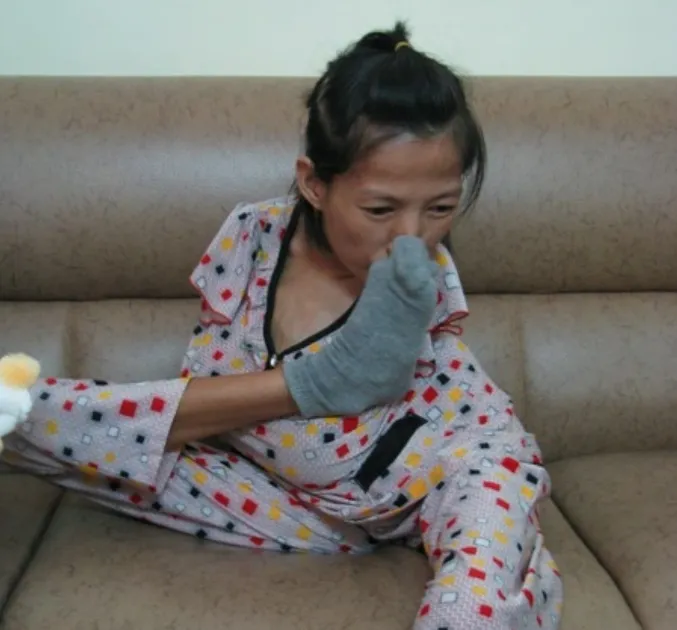
Legacy and Inspiration
Nhung’s story is a demonstration of what is possible when courage and necessity intersect. It challenges assumptions about disability, motherhood, and human capability. Her life, intertwined with her daughter’s, reflects struggle and triumph, hardship and beauty. It asks us to reconsider what it means to be capable, to love, and to persevere.
The contrast between her fragile body and immense spirit is striking. Holding and feeding her child with her feet embodies human adaptability and maternal instinct, resonating universally. Caregiving, she shows, is less about physical ability and more about attention, dedication, and love.
As her daughter grows, Nhung continues to invent new ways to care for her, navigating life with patience, creativity, and resilience. Her mother, Thị Nại, supports when needed, allowing Nhung autonomy. Together, they form a partnership rooted in shared struggle, love, and determination.
A Story of Courage, Love, and Hope
Hồng Nhung’s journey is more than a tale of physical adaptation. It is a story of courage against overwhelming odds, a testament to maternal love unbounded by physical limitations, and a portrait of hope that refuses to yield. Each day, as Nhung cradles, feeds, and comforts her daughter, she sends a quiet yet profound message: the human heart is capable of overcoming obstacles, nurturing life, and expressing love in unexpected ways.
In a world quick to judge ability by the physical, Nhung redefines what is possible. Through her careful and deliberate use of her feet, she teaches her daughter the first lessons of care, tenderness, and love. She transforms every limitation into opportunity, every hardship into a demonstration of courage.
Her journey is far from over, yet it already stands as a testament to resilience, maternal love, and human determination. Hồng Nhung is a living example of hope, perseverance, and the limitless potential of love in the face of adversity. Her story continues to inspire, reminding the world that strength is measured not by what one has, but by what one chooses to give.


